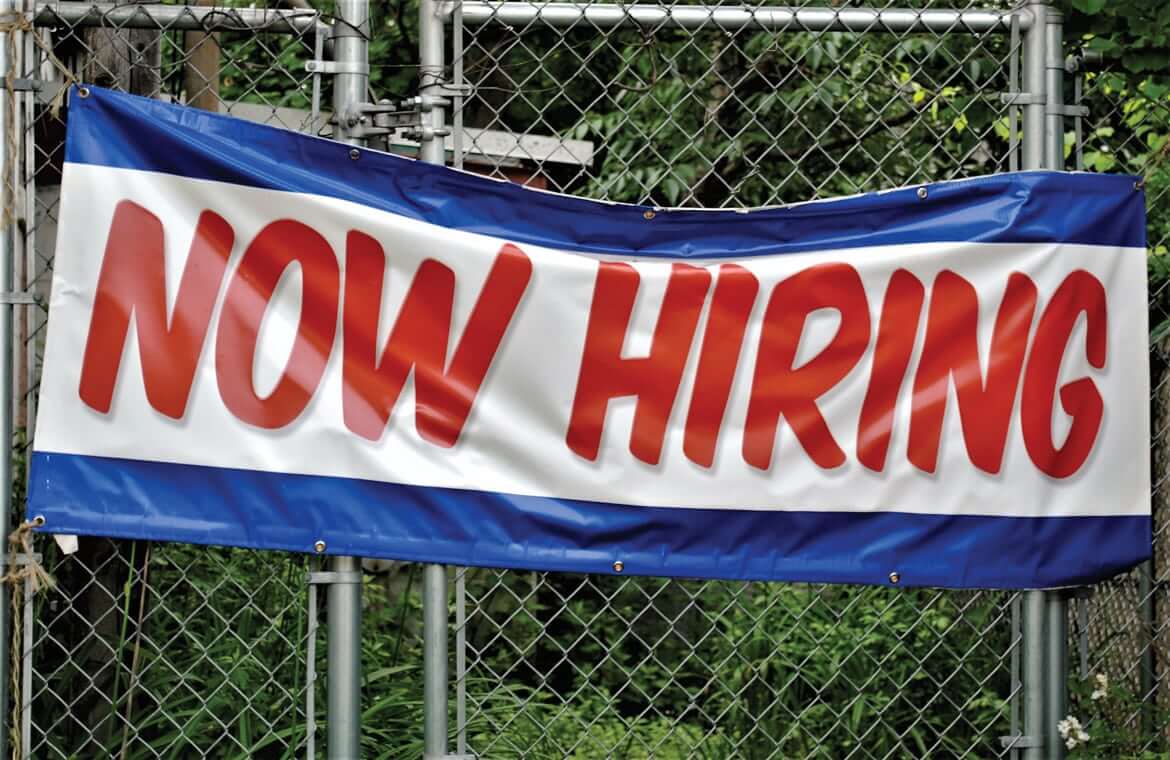Jobs Go Asking


Help wanted signs — they seem to be everywhere on the East End, revealing the struggle businesses are experiencing in finding both seasonal and full-time help they need. Yet, speak to eastbound commuters and they will insist that there has been a noticeable increase in traffic, especially the trade parade. If there’s an increase in traffic, why are businesses still struggling to find the employees they need?
Many local business owners depend on workers who must obtain work visas in order to enter the United States. Businesses who sponsor these workers have been given approval for a fewer number than in the past. Several well-known landscaping companies, whose owners would not give their names, said that they have been hiring under the visa work program for more than 25 years and had never had a problem. “This year, however, is a different story,” one of the owners said.
Meanwhile, in Montauk, “There is no one knocking on the door for jobs,” Bryan Gosman, a partner and manager of Gosman’s wholesale fish business, said this week. The problem, he said, is that the United States Citizenship and Immigration Services has cut the number of H-2B work visas it is issuing for the year, after Congress set a cap of 66,000 for the fiscal year, down from 83,600 in 2017. The H-2B visa allows non-citizens to enter the country for non-agricultural jobs.
In years past, Gosman’s wholesale division would bring in 16 workers from Jamaica on H-2B visas to work through the summer season. These are workers who are familiar with the operation, he said. This year, though, besides reducing the number of visas it was issuing, the Department of Homeland Security switched to a lottery system, Gosman said. Employers who are chosen through the lottery get the full complement of visas they applied for. Those who lost in the lottery truly lost out. “We put our application in. We got nothing,” he said.
“We’ve always had visas for people, people who have been coming for four or five years and know what they are doing,” said Holly Edmiston, who runs the retail shop at Gosman’s. “In the entire complex, only the restaurant won the lottery. The rest of the complex is short on experienced workers. We are going to have to lower our business expectations because we don’t have enough workers to do the work,” Edmiston said.
“This is happening all over the East End. Many companies, many places don’t have people this year. We are supposed to provide services for all the people who come out here and we really can’t,” she lamented.
The owner of the Squeezery in Amagansett, Sam Schoenheiner, also believes there are fewer people coming to the U.S. on work visas because U.S. Customs authorities are making it more difficult for workers to prove they will not stay beyond their visas.
His Irish friends have relayed stories of people receiving visa approval and then being stopped at either Shannon Airport in Ireland or John F. Kennedy Airport in New York by U.S. Customs agents and prevented from entering the U.S. because they could not prove they had a reason, such as school, to return to Ireland.
Lack of Affordable Housing
Joe Gibson, the manager of Power Equipment Plus in East Hampton, has been trying to fill several open positions for quite some time without success. He believes that the “lack of affordable housing plays a part in this too.” Gibson, himself, is one of many who commute from up island, spending multiple hours on the road, roundtrip. “It’s just too expensive to live here,” he added.
Jay Silhan, general manager of the Mill House Inn in East Hampton, runs an ongoing ad in the help wanted section of newspapers in the hope that he will find the right individuals to fill its open, year-round hospitality positions.
“The restrictions being placed on work visas is definitely a contributing factor,” echoed Silhan, “but the lack of affordable housing is the biggest factor. My positions are for year-round employment. That means someone has to find housing, but they can’t afford to live here, so why should they want to work here?”
He added, “Hospitality is a demanding field. You have to want to serve people. There’s no fame and glamour involved in it. You have to want to be in this field and for us, because we have such high-end clients, we expect a lot from our staff. Things were different back in 2010 to 2011. You could rent a house. Now people have realized that they could do short-term rentals and make a lot more money that way.”
So far, it seems that restaurants that have housing options available are not running into the same problems finding staff because they are able to put them up for the summer, according to Schoenheiner.
Like Silhan, Scott Rubenstein of East Hampton Indoor Tennis is wrestling with staffing his tennis facility as well as the Clubhouse, which will include a bowling alley, miniature golf, and other amenities. Rubenstein has always been compelled to supplement the housing costs for his seasonal tennis employees.
He has approached the East Hampton Town Board with a proposal to convert an already existing building on the property to living quarters for his staff. The building already has heating, cooling, and septic systems already in place, Rubenstein noted.
“It’s really a no-brainer. It has so many benefits. It would reduce traffic. The staff could walk to their apartment, they can eat their meals here, and they’re not jumping into their cars to travel back and forth. It would at least take these people off the roads,” he said.
“I think the town and business owners need to start thinking of ways to provide affordable housing to employees if they expect people to work out here,” Rubenstein continued. “Businesses that have room on their property should consider building housing that they can offer to their employees. If they already have an existing building, like we have, they should think about using it. It may be the only way that we can start to really offer affordable housing and attract those workers that we need to fulfill our business needs.”
Deep Hollow Ranch, has, in the past, housed its workers in the cottages on the neighboring Theodore Roosevelt County Park. Deep Hollow relies on workers with student visas. This year, just before the start of the season, Deep Hollow was told by the county that the cottages were not available, forcing it to scramble for housing.
Job Market Tight Across County
Shital Patel, an analyst with the New York State Department of Labor, said the unemployment rate in Suffolk County was 4.1 percent in April, with May’s numbers due out this week. While that is above the national rate of 3.8 percent, the labor market is tight in Suffolk County, she said, with strong growth in the health care and construction sectors.
At the Squeezery, Schoenheiner said his restaurant is having trouble finding skilled labor, though it has extended its search, placing ads in newspapers, and online with job search websites such as Monster.com. He believes the shortage can be attributed to multiple factors, including a lack of local skilled labor willing to work full-time over the summer, as well as immigration and housing issues.
“There are a lot less people coming in the door than last year,” Schoenheiner said of prospective employees.
Schoenheiner said that, while there are local students returning home from school to work for the summer, they are not always experienced and require training from the ground up, which costs him money. Compounding this, not all are willing to work full-time, he said.
“You can’t run a high-volume bar with unskilled labor,” he added. “They have to know their way around a bar.”
Adjusting to the hiring climate this year, Schoenheiner has opted to train more staff this season.
Not everyone is having a problem with finding staff this summer, though, such as The Long Island Aquarium in Riverhead, which holds large catered parties and events, reported Darlene Puntillo, director of marketing and advertising. The owner of Oakland’s, Christine Oakland Hill, said the iconic Hampton Bays restaurant is not having hiring woes either, as it has “solid staff” that returns annually.
valerie@indyeastend.com
Additional reporting by Peggy Spellman Hoey, Tom McMorrow, and Jade Eckardt.









